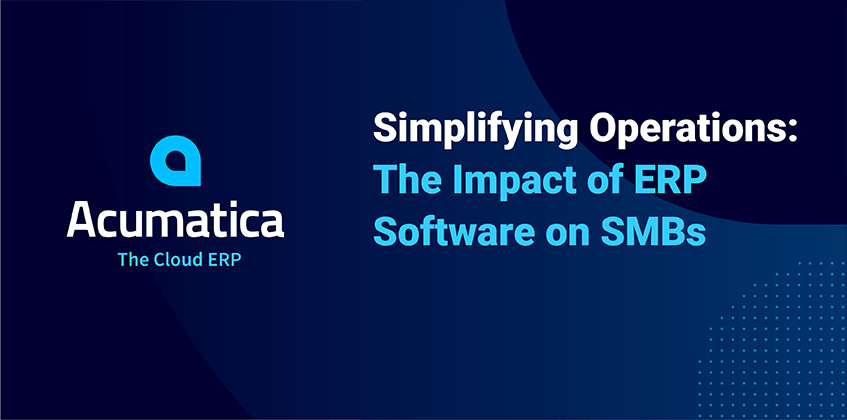
Starting a business can be difficult— any small business owner knows that. But starting seems like a walk in the park compared to operating a business. That is unless you find ways to simplify your operations.
Streamlining and simplifying your business is the key to growing your SMB without experiencing burnout as an entrepreneur. To do that, you’ll need the right business management tools. One tool you should have in your arsenal is ERP software.
How can ERP software help you streamline your business? Understanding the potential impact ERP software can have on your small business and how to implement an ERP solution is essential to getting the most out of your technology investment.
7 Key Benefits of ERP Software in Small Businesses
Let’s start with the basics. ERP (Enterprise Resource Planning) software is a business application suite that automates various business processes and functions across an organization. The right solution can help increase efficiency, streamline processes, and promote a culture of collaboration within the organization.
One study showed that 50% of businesses planned to acquire or upgrade their ERP systems. Why are these companies prioritizing ERP software? Any of these seven benefits should likely convince you it’s worth having.
1. Centralized Business Processes
An ERP system provides a unified platform where all business processes come together. Running a business where your sales, inventory, finance, and HR teams operate on different software can be chaotic. ERP software interconnects all your departments in one place.
For instance, you can set up an automation that updates inventory and adjusts your accounting books when sales come in. This eliminates redundancy and ensures consistency across departments.
2. Real-time Data Access
Real-time access to critical business data means decision-makers can get up-to-date insights whenever they need them. With SMB ERP solutions, you can instantly see which products sell the most, which are running low, and even track customer buying habits — letting you make informed decisions about restocking, marketing strategies, and more.
3. Enhanced Reporting and Analysis
Advanced reporting and analysis is another game-changer you enjoy with data-driven ERP solutions. The right solution will offer robust reporting tools that can generate comprehensive business reports.
For SMBs looking to expand their business, ERP software can generate detailed reports to analyze sales trends, customer preferences, and seasonal shifts, allowing you to strategize more effectively. If you take customer insights and pair it with a business expert with the best online doctorate in psychology, you can make business-transforming decisions.
4. Improved Customer Service
Happy customers are the backbone of any business, and the right ERP solution for small business operations can enhance customer service by streamlining operations and ensuring timely responses.
ERP enables customer service representatives to immediately pull up order details, check its status, and address any client concerns. This swift response satisfies the customer and builds trust. You can ensure top-notch service by integrating customer relationship management (CRM) modules in your ERP.
5. Cost Savings
While the initial investment in an ERP solution might seem high, the long-term cost savings will be significant. With streamlined operations, reduced manual tasks, and minimized errors, businesses can save time and money.
6. Scalability
As your business grows, so do your operational requirements. The beauty of an ERP system is its scalability. Today, you might be a local business with one location, but what if you plan to expand nationally or globally?
With a cloud-based ERP for small businesses, new modules or users are easy to add as your business needs evolve. So, when you expand your business, instead of setting up a whole new system, you can simply extend your existing ERP to accommodate new locations.
7. Regulatory Compliance and Security
Staying compliant with industry regulations can be daunting, especially for smaller businesses. ERP systems help businesses adhere to these regulations by ensuring standardized and traceable processes.
How to Simplify Your Operations Using ERP Software (Step-by-Step)
Implementing an ERP system can significantly simplify business operations. Here’s a step-by-step guide to achieve this:
1. Define Clear Objectives:
Having clear objectives and determining what you want to achieve with the ERP system will guide your ERP selection and implementation process.
2. Choose the Right ERP Solution:
Not all ERP systems are created equal, so you’ll have to do your research. Check multiple options and solutions and choose one that aligns with your business needs.
3. Map Out Current Processes:
Before integrating operations into the ERP, document all existing business processes so you can easily map them out digitally with your system. This will give you a clear picture of your operations and help identify areas of redundancy or inefficiency that the ERP can address.
4. Customize and Configure:
While many ERP systems come with standard features, many will need manual configuration to fit your specific business needs. Some customizations might include custom workflows, report templates, or user access levels. Some ERP systems also offer industry-specific modules you can tailor to your operations.
5. Data Migration:
Transferring all relevant data from your existing systems to the ERP can be a complex step involving data cleaning, validation, and ensuring data integrity, but it will be worth it once you have all your data in one place for processing and storage.
6. Provide Comprehensive Training:
An ERP system is only as good as the people using it. So, you’ll need to ensure that every team member receives adequate training from management to ground-level employees.
7. Monitor and Optimize:
You should consistently monitor performance once your ERP system is up and running. Gather feedback from users about any challenges they face or suggestions they might have to improve your workflow. Over time, you might find areas that need further customization or additional modules.
8. Regularly Review Processes:
As your business grows and evolves, so should your ERP processes. Periodically review and adjust workflows to match any business strategy or operations changes.
ERP Systems Bringing Brighter Futures for SMBs
The ERP software solution industry is expected to grow to $49.50 billion by 2027, indicating an increased demand for these solutions. This only shows that businesses, regardless of size, see these tools’ value.
Discover how ERP can help business grow. Embrace the digital economy with Acumatica Cloud ERP, which is tailored to deliver powerful business benefits and cost savings. Contact us today to learn more about how our system can transform your company.
 Canada (English)
Canada (English)
 Colombia
Colombia
 Caribbean and Puerto Rico
Caribbean and Puerto Rico
 Ecuador
Ecuador
 India
India
 Indonesia
Indonesia
 Ireland
Ireland
 Malaysia
Malaysia
 Mexico
Mexico
 Panama
Panama
 Peru
Peru
 Philippines
Philippines
 Singapore
Singapore
 South Africa
South Africa
 Sri Lanka
Sri Lanka
 Thailand
Thailand
 United Kingdom
United Kingdom
 United States
United States





